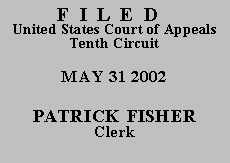 UNITED STATES COURT OF APPEALS
UNITED STATES COURT OF APPEALS
 UNITED STATES COURT OF APPEALS
UNITED STATES COURT OF APPEALS
TENTH CIRCUIT
| BILLY JOE WINROW, | |
| Petitioner - Appellant, | |
| v. | |
| REGINALD HINES, Warden, | |
| Respondent - Appellee,
and ATTORNEY GENERAL OF THE STATE OF OKLAHOMA and DREW EDMONDSON, Respondents. |
This is a pro se § 2254 prisoner appeal. Mr. Winrow was convicted of robbery with a firearm after former conviction of two or more felonies. He was sentenced to 102 years of imprisonment. His direct appeal and state post-conviction appeal were unsuccessful.
In his § 2254 petition, Mr. Winrow claimed his constitutional rights were violated because the jury pool saw him in the hallway in an orange jumpsuit, handcuffs, and leg manacles. He also claimed he was denied due process because the district attorney's staff told the robbery victim to sit next to the courtroom door so that he could view Mr. Winrow coming into the hallway on the first day of trial. Mr. Winrow also argued that there was insufficient evidence to support the conviction because the victim and the police could not identify him as the robber.
The magistrate judge recommended that Mr. Winrow's § 2254 petition be denied because he procedurally defaulted all three of his habeas claims in the state courts and did not show cause and prejudice or a fundamental miscarriage of justice to excuse the procedural default. After consideration of Mr. Winrow's objections, the district court adopted the recommendation and denied the petition. Mr. Winrow then applied to this court for a certificate of appealability.
In order for this court to grant a certificate of appealability, Petitioner must make "a substantial showing of the denial of a constitutional right." 28 U.S.C. § 2253(c)(2). To do so, Petitioner must demonstrate that "reasonable jurists could debate whether (or, for that matter, agree that) the petition should have been resolved in a different manner or that the issues presented were adequate to deserve encouragement to proceed further." Slack v. McDaniel, 529 U.S. 473, 484 (2000) (quotations omitted).
We have carefully reviewed Mr. Winrow's brief, the district court's disposition, and the record on appeal. Nothing in the facts, the record on appeal, or Petitioner's brief raises an issue which meets our standards for the grant of a certificate of appealability. For substantially the same reasons as set forth by the district court in its Order of October 11, 2001, adopting the magistrate's report and recommendation in its entirety, we cannot say that "reasonable jurists could debate whether (or, for that matter, agree that) the petition should have been resolved in a different manner." Id. We DENY Petitioner's request for a certificate of appealability and DISMISS the appeal.
Petitioner's motion to proceed in forma pauperis on appeal is GRANTED.
Entered for the Court
Monroe G. McKay
Circuit Judge
*. This order and judgment is not binding precedent, except under the doctrines of law of the case, res judicata, and collateral estoppel. The court generally disfavors the citation of orders and judgments; nevertheless, an order and judgment may be cited under the terms and conditions of 10th Cir. R. 36.3.